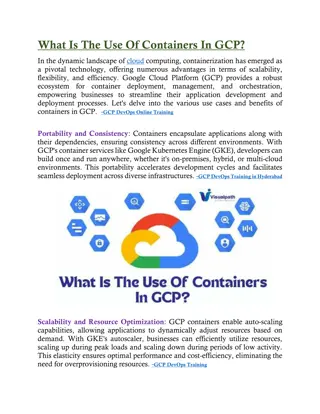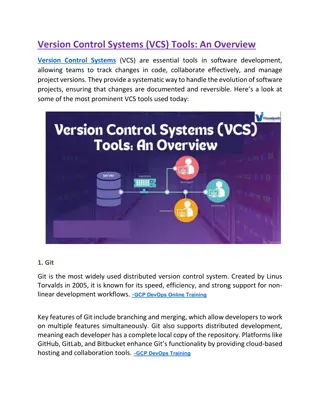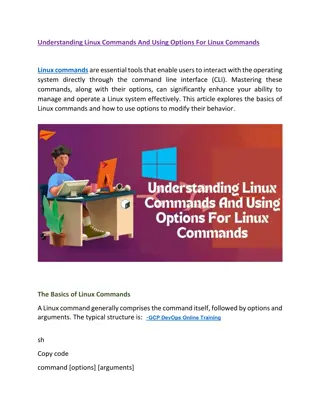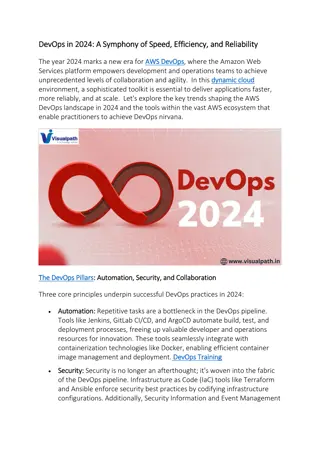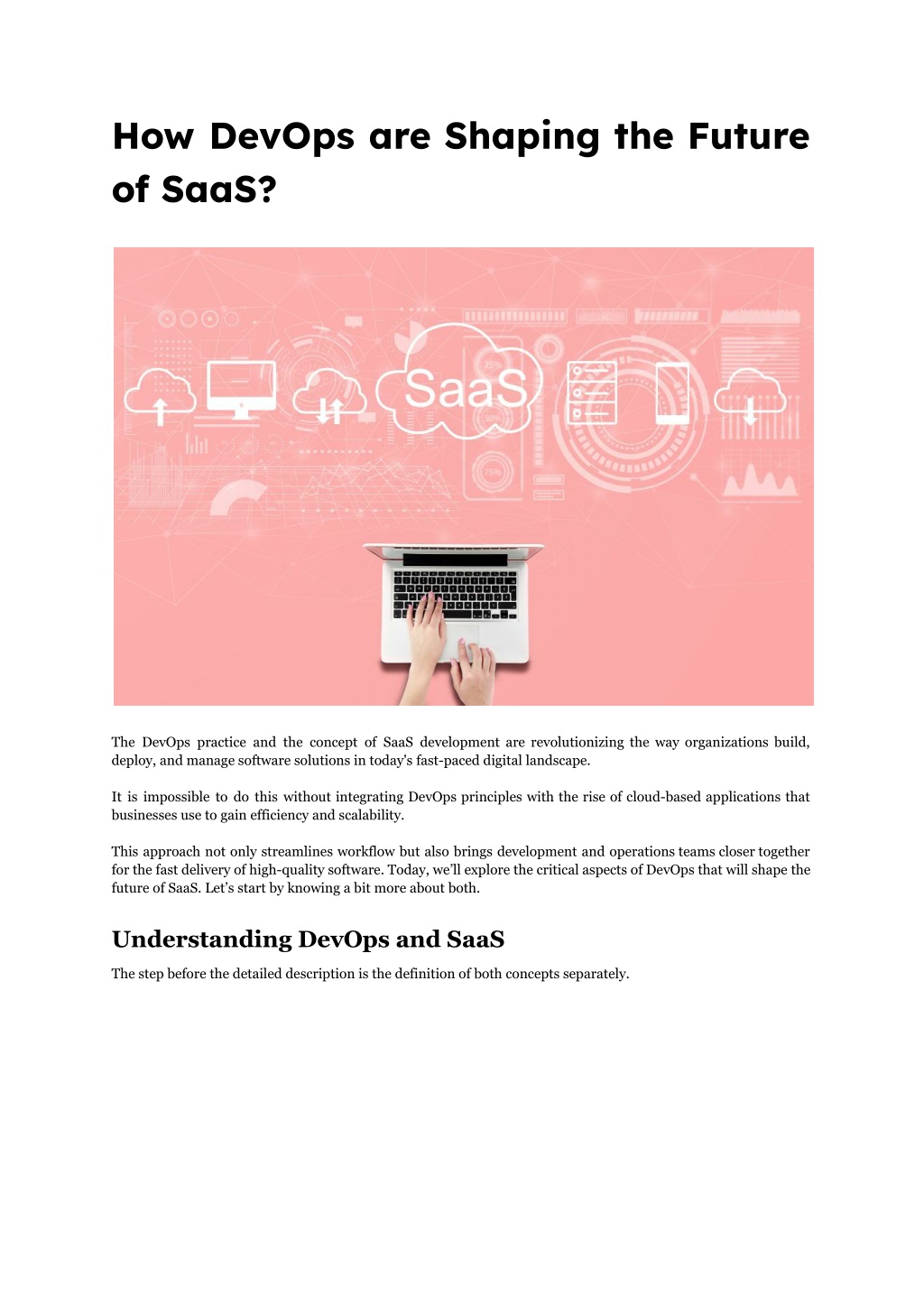
How DevOps are Shaping the Future of SaaS
In this insightful PDF, we explore the pivotal role of DevOps in transforming the Software as a Service (SaaS) landscape. As the demand for rapid deployment and continuous delivery increases, DevOps practices are becoming essential for organizations
Download Presentation

Please find below an Image/Link to download the presentation.
The content on the website is provided AS IS for your information and personal use only. It may not be sold, licensed, or shared on other websites without obtaining consent from the author. If you encounter any issues during the download, it is possible that the publisher has removed the file from their server.
You are allowed to download the files provided on this website for personal or commercial use, subject to the condition that they are used lawfully. All files are the property of their respective owners.
The content on the website is provided AS IS for your information and personal use only. It may not be sold, licensed, or shared on other websites without obtaining consent from the author.
E N D
Presentation Transcript
How DevOps are Shaping the Future of SaaS? The DevOps practice and the concept of SaaS development are revolutionizing the way organizations build, deploy, and manage software solutions in today's fast-paced digital landscape. It is impossible to do this without integrating DevOps principles with the rise of cloud-based applications that businesses use to gain efficiency and scalability. This approach not only streamlines workflow but also brings development and operations teams closer together for the fast delivery of high-quality software. Today, we ll explore the critical aspects of DevOps that will shape the future of SaaS. Let s start by knowing a bit more about both. Understanding DevOps and SaaS The step before the detailed description is the definition of both concepts separately.
What is DevOps? DevOps is a cultural and professional movement that aims at uniting collaboration between teams of development and operations, often abbreviated as DevOps. Its key aim is to reduce the lifecycle period of software while persistently providing high-quality software. It is implemented through continuous integration and continuous delivery practices, automated testing, infrastructure as code, and attention towards monitoring and feedback. What is SaaS? SaaS stands for cloud-based software provided to customers via the Internet. It has absolutely eliminated the requirement of having software installed locally on the machine by an end user for increasing flexibility, scalability, and reducing the costs of the organization. The intersection of DevOps and SaaS brings great improvements in the efficiency of software delivery and smooth operational processes, making it a very important area that businesses need to explore. The Combination of DevOps and SaaS Accelerated Development Cycles Perhaps the most deep impact of DevOps on SaaS development is accelerating the development cycle. With the CI/CD pipeline, a SaaS software development company can automate testing and deployment processes for code.
That would reduce manual intervention, possibility of errors, and the speed at which updates and new features are delivered to the users. Companies can respond faster with customer feedback through the shorter cycles of development, thus maintaining their software relevant and competitive within the market. Enhanced Coordination and Communication DevOps encourages the relationship between the development and operation teams. Teams in a company providing DevOps services cooperate more closely, sharing each other's responsibilities and expertise. This means everyone being on the same page thus less likely to be misaligned and misunderstanding. SaaS, here, provides a better integrated overall approach toward the creation of software; performance, security, and user experience start with the approach to software development. This has seen an increase in software quality and reliability Better Reliability and Quality With automated testing and continuous monitoring in place, the quality of SaaS products increases significantly in reliability. A SaaS software development company can use these DevOps practices and identify issues even before they affect the users. This allows teams to have an instant view of how people use the application and performance metrics. This approach, being data driven, causes the resolution of issues that happen proactively, giving rise to a stable and reliable product. Scalability and Flexibility SaaS applications scale well. The SaaS application can sustain more users without a change in performance. DevOps can update the underlying infrastructure effectively and efficiently. With a firm that offers DevOps services, containerization, and orchestration tools like Docker and Kubernetes enable an easy speed of application deployments on other environments, ensuring the capacity for SaaS businesses to react accordingly to changing market conditions by requiring less downtime and fewer resource leftovers. Enhanced Security Security is the most critical element for any software application, especially SaaS products since they frequently deal with sensitive user data. DevOps includes security practices in the development process, which is called DevSecOps. The integration of security at every stage in the SDLC provides a SaaS software development company with an opportunity of addressing vulnerabilities on time as well as meeting compliance requirements. Therefore, it is a low-risk approach toward data breach and enhances the trust the users have for the tool. The Future of SaaS Development with DevOps Further down the road, technology advancements will further entrench synergy between DevOps and SaaS. Here are a few of the trends to look forward to: More AI and Machine Learning AI and machine learning are increasingly becoming integral to SaaS applications. By leveraging AI software development services, along with data analytics and automation, companies utilizing DevOps services can enhance their decision-making processes while simultaneously improving operational efficiency.
More Emphasis on Customer Experience User experience will remain at the heart of SaaS companies. DevOps practices help organizations collect and analyze user feedback better, thus continuously improving applications. Continuous Learning and Adaptation The technology landscape is constantly changing, and continuous learning will be necessary. DevOps encourages an experimental culture and adaptation that allows teams to innovate fast and adapt to new challenges. Cloud-Native Development Therefore, cloud-native architectures will lead in the development of SaaS. Through DevOps, organizations are able to transition with even better efficiency and ease as they are able to build and deploy applications. Parting Thoughts This trend of DevOps and SaaS is changing the development landscape. Organizations can embrace these approaches and speed up the process, improve collaboration and security, and deliver great software products with the help of a trustworthy DevOps services company like ScalaCode. As the demand for SaaS applications continues to rise, embracing DevOps practices will be of utmost importance to companies looking to stay ahead in the race and meet the evolving needs of their users. The future of SaaS is indeed bright, and with appropriate strategies in place, businesses will be positioned to succeed in this dynamic environment. Source URL: https://newsrapt.com/how-devops-are-shaping-the-future-of-saas/















